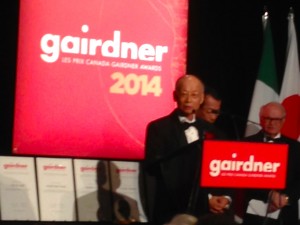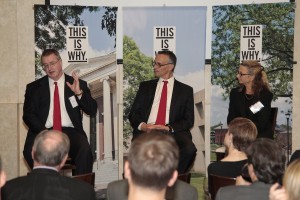Happy Labor Day and first day of classes! The following is cross-posted from The Daily Beast.
There is a tradition in this country stretching back to Thomas Jefferson of lofty ideals for our colleges and universities. Liberal learning is said to prepare one for autonomy and for citizenship. As Ralph Waldo Emerson emphasized, it also led one away from the crowd; it helped one escape mere imitation and opened access to authenticity. Finally, education offered the opportunity to discover work that would be meaningful — to find one’s “passion.”
But, as I describe in Beyond The University: Why Liberal Education Matters, there is another tradition stretching back just as far questioning the “real world” relevance of these lofty ideals. Is it right to speak of “finding meaningful work” when available work might necessarily involve drudgery and worse? Is it right to emphasize citizenship and finding one’s passion to students who first and foremost are desperate to find a job? Such questions, so much on our minds today, were especially urgent for freed African slaves and their descendants at the beginning of the 20th century.
In 1903, Booker T. Washington voiced the following complaint about education for African-Americans:
There were young men educated in foreign tongues, but few in carpentry or in mechanical or architectural drawing. Many were trained in Latin, but few as engineers and blacksmiths. Too many were taken from the farm and educated, but educated in everything but farming.
Washington was a passionate advocate for an intensely practical education for ex-slaves and their descendants. He was born a slave on a small farm in Virginia and after the Civil War found work in the mines of West Virginia. After his education at the Hampton Institute, Washington was convinced that only by achieving economic success would blacks ever be recognized by white Americans as full members of society. Education should make people self-reliant, in Emerson’s ideal sense, but for Washington self-reliance was first and foremost the ability to earn a decent living.
Washington’s fame was as a teacher, institution builder (especially at the Tuskegee Institute), fundraiser, and spokesperson for the view that American blacks needed an intensely practical, vocational education. He appealed to ex-slaves and their descendants who were looking for a path out of poverty, and he appealed to whites who appreciated his decision not to demand much in the way of political or cultural change. Washington was an “accomodationist,” willing to work within the structures for legal subordination of blacks in the South as long as he was able to promote black economic advancement. His message resonated with wealthy industrialists, high-toned educators, and even presidents. He was the most famous black man in America at the end of the 19th century.
Born shortly after the Civil War, W.E.B. Du Bois came into his own just as Washington was reaching the height of his fame. Du Bois was a prodigious intellectual with a slew of degrees–bachelors diplomas from Fisk and Harvard, eventually a Ph.D. also from Harvard (he was the first black person to receive one there) with continued graduate work in Berlin. He was a classics professor and a historian who wrote sociology (highly praised by Max Weber), poetry, plays, and fiction–to name just some of the genres in which he worked.
Washington was impressed by the American desire for material success and wanted to build progress for African Americans based on their ability to be successful in the economy. Du Bois, on the other hand, emphasized political and civic equality, along with the Jeffersonian notion of “education of youth according to ability.” Education was at the core of the differences between the two. “The pushing of mere abstract knowledge into the head means little,” Washington had written. “We want more than the mere performance of mental gymnastics. Our knowledge must be harnessed to the things of real life.” Du Bois agreed, but he wanted to broaden what might count as “the things of real life” so that the pursuit of happiness wouldn’t be reduced to the pursuit of dollars:
The function of the university is not simply to teach bread-winning, or to furnish teachers for the public schools, or to be a center of polite society; it is, above all, to be the organ of that fine adjustment between real life and the growing knowledge of life, an adjustment which forms the secret of civilization.
Du Bois was acutely aware that the “fine adjustment” between life and knowledge was especially problematic in a society of oppressive racial inequality, a society that had denied many blacks the most rudimentary education in the years after emancipation. He was committed to the ideal that education was a path to freedom, but he also acknowledged the fact that different people need different kinds of educational opportunity:
How foolish to ask what is the best education for one or seven or sixty million souls! Shall we teach them trades, or train them in liberal arts? Neither and both: teach the workers to work and the thinkers to think; make carpenters of carpenters, and philosophers of philosophers, and fops of fools. Nor can we pause here. We are training not isolated men but a living group of men–nay, a group within a group. And the final product of our training must be neither a psychologist nor a brickmason, but a man.
Educational institutions should aim to stimulate hunger for knowledge — not just contain it or channel it into a narrow path destined for a job market that will quickly change. Education should not teach the person to conform to a function, a repetition of slavery, but should provide people with a wider horizon of choices.
Du Bois repeatedly defended liberal education against those who saw it as impractical. In an address at the Hampton Institute in the beginning of the century, he lamented that “there is an insistence on the practical in a manner and tone that would make Socrates an idiot and Jesus Christ a crank.” At one of the centers of industrial learning for blacks, Du Bois argued that its doctrine of education was fundamentally false because it was so seriously limited. What mattered in education was not so much the curriculum on campus but an understanding that the aim of education went far beyond the university. And here is where Du Bois issued his challenge:
The aim of the higher training of the college is the development of power, the training of a self whose balanced assertion will mean as much as possible for the great ends of civilization. The aim of technical training on the other hand is to enable the student to master the present methods of earning a living in some particular way . . . We must give our youth a training designed above all to make them men of power, of thought, of trained and cultivated taste; men who know whither civilization is tending and what it means.
The differences between Washington and Du Bois, and the tensions between the lofty and practical ideals for higher education, are instructive for us today. Sure, we must pay attention to what our graduates will do with their education, and we must give them the skills to translate what they learn in classrooms to their lives after graduation. But we shouldn’t reduce our understanding of “their lives after graduation” to their very first job — which should be the worst job they’ll ever have. We must recommit ourselves instead to ensuring that a broad, liberal education is also pragmatic — in Washington’s words, “harnessed to the things in real life,” to productive skills valued beyond the university. By doing so, we will also achieve what Du Bois championed: practical idealism based in lifelong learning.



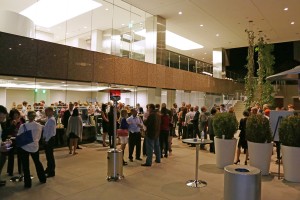
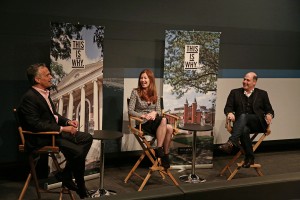
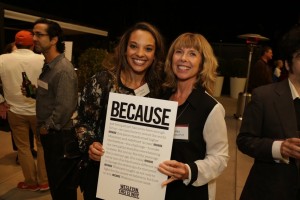
![alu_act_2014-1030092405[1][1]](https://roth.blogs.wesleyan.edu/files/2014/10/alu_act_2014-103009240511-300x200.jpg)
